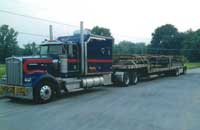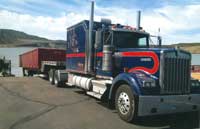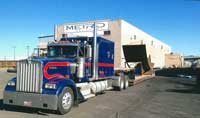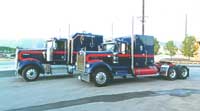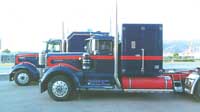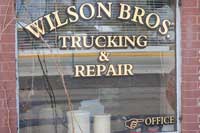
|
|||
Our Mission |
Wilson Bros.' promise, "You'll be surprised how far we'll go for you." is not mere hype; it is our commitment to go beyond the expectations of what companies need. We give our clients peace of mind knowing that their business won't be disrupted by trucking pains.
We are about exceeding our customers' expectations and it is noticeable that we just care more. We work harder and are better rewarded than our competition. It's a simple philosophy that works - "We will do all we can to protect our customers goods and reputation.
Customer service has always been our focus and we take great pride in ensuring that our customers receive the same level of consistent service everywhere we go. We do this by staying true to our core assets: our people, our systems, and our customers for over 25 years.
Our Services: Oversized loads are our specialty • We have Double Drop Stretch Trailers, Stepdecks and Flatbeds.
Less than truckload (LTL)
LTL shipments typically weigh between 151 and 20,000 lb (68 and 9,072 kg). Less than truckload carriers collect freight from various shippers and consolidate that freight onto enclosed trailers for linehaul to the delivering terminal or to a hub terminal where the freight will be further sorted and consolidated for additional linehauls. In most cases, drivers start the day by loading up and heading out to make deliveries first, then begin making
pickups once the trailer has been emptied for return to the terminal for sorting and delivery next day; thus, most pickups are made in the afternoon and most deliveries are performed in the morning.
Pickup/delivery drivers usually have set casual routes which they travel every day or several times a week, so the driver has an opportunity to develop a rapport with his customers. Once the driver has filled his trailer or completed his assigned route, he returns to his terminal for unloading. The trailer is unloaded and the individual shipments are then weighed and inspected to verify their conformity to the description contained in the accompanying paperwork.[3] All LTL freight is subject to inspection for this purpose, though not all freight is inspected. Next, the freight is loaded onto an outbound trailer which will forward the freight to a breakbulk, a connection, or to the delivering terminal. An LTL shipment may be handled only once while in transit, or it may be handled multiple times before final delivery is accomplished.
Transit times for LTL freight are longer than for Full Truckload freight (FTL). LTL transit times are not directly related only to the distance between shipper and consignee. Instead, LTL transit times are dependent upon the makeup of the network of terminals and breakbulks that are operated by a given carrier and that carrier's beyond agents and interline partners. For example, if a shipment is picked up and delivered by the same freight terminal, or if the freight must be sorted and routed only once while in transit, the freight will likely be delivered on the next business day after pickup. If the freight must be sorted and routed more than once, or if more than one linehaul is required for transportation to the delivering terminal, then the transit time will be longer. In some instances the LTL freight has up to 10 days of delivery time frame. Also, delivery to beyond points or remote areas will almost always add days to the transit time.
The main advantage to using an LTL carrier is that a shipment may be transported for a fraction of the cost of hiring an entire truck and trailer for an exclusive shipment. Also, a number of accessorial services are available from LTL carriers, which are not typically offered by FTL carriers. These optional services include liftgate service at pickup or delivery, residential (also known as "non-commercial") service at pickup or delivery, inside delivery, notification prior to delivery, freeze protection, and others. These services are usually billed at a predetermined flat fee or for a weight based surcharge calculated as a rate per pound or per hundredweight.Full truckload (FTL)
Full truckload carriers normally deliver a semi trailer to a shipper who will fill the trailer with freight for one destination. After the trailer is loaded, the driver returns to the shipper to collect the required paperwork (i.e. Bill of lading, Invoice, and Customs paperwork) and depart with the trailer containing freight. In most cases the driver then proceeds directly to the consignee and delivers the freight him or herself. Occasionally, a driver will transfer the trailer to another driver who will drive the freight the rest of the way. Full Truckload (FTL) transit times are normally constrained by the driver's availability according to Hours of Service regulations and distance.
Truck Repair
We do repairs and ordering of parts to keep it easy for you and everything in one place. Call us for questions? Call cell:801-330-7122 or Office: 801-292-3008
